Lisi Desai, a disabled Catholic woman who helps hundreds of disabled people in Bangladesh (Photos)
The young woman is suffering from a degenerative muscle disease contracted at university. In Bangladesh there are more than a million disabled people, abandoned by the authorities and society. She helps educate them to be independent and self-reliant. The Church can change the faithful’s way of thinking. People with disabilities are "another aspect of God's grandeur."
Dhaka (AsiaNews) – A young Catholic woman, Lisi Desai, helps hundreds of disabled people meet their daily challenges and improve their living conditions. Disabled herself, she is a member of the Borni Parish Church (diocese of Rajshahi) with a degree in English from one of Dhaka’s foremost universities.
Speaking to AsiaNews, she said she had a normal childhood and youth until she went to university where she was struck by high fever. After months of inconclusive medical exams, she was diagnosed with a rare incurable muscle degeneration.
She overcame the initial dejection by a new awareness that the disability could be transformed into an impulse to serve others. At present, she works for a foundation in Dhaka that defends the rights of people with disabilities in a country that has more than one million disabled people. The interview with her follows below.
Please tell your story in a few words. How did you become disable?
I was born and grew up as a normal child (with no physical or mental limitation) up to my university years. During my Master’s degree, I had been suffering from a high fever and became fragile and weak. After recovery from fever, I used to feel very tired after short walks; but i continued my studies and daily life with no significant hardship. After completing my studies, I did feel even weaker and more exhausted because my health was deteriorating day by day. I started to limp and began to stumble most of the time. I consulted various medical services and tried different types of medical treatment in Bangladesh like orthopaedics, neurologists, physiotherapy, homeopathy, herbal, acupuncture, acupressure, etc., but nobody could diagnose my actual problem or could provide a solution. After a few months in India, I was told that I had a muscle disease and that there was no medical solution to this problem. Later, I went to Kerala, India, for Ayurvedic treatment, but nothing could give me back my normal way of life.
After returning from India, I started working. During that time, my physical condition further deteriorated. I lost my physical strength and balance as well and I could not cope with the physical, psychological and environmental stress. I quit the job and returned to my home village. I was exposed to a different world full of harshness, contradictions, uncertainties, pessimism and disillusionment. I was shocked to find how the attitudes of people in my community had changed towards me! I was crestfallen, like a defeated soldier with no hope in life.
After going through a long battle and conflict with my inner self, I discovered a new way to become implicated in life. I decided to shed my frustrations and started my life anew holding onto the motto of “never give up”. Thus, disability has transformed my perception and mission in life. I have internalized the truth that this is part of life's diversity, and instead of rejecting the present condition, I began a new journey embracing all of my physical limitations and challenges.
You are boldly working for rights of people with disability. What is situation for people with disability in Bangladesh?
In Bangladesh persons with disabilities are still left behind. The attitudes of general population are the main barriers for people with disabilities. They are not accepted or included everywhere in the society. Their entrance and participation are restricted. The infrastructure and transports are not accessible to them. Nowadays people with disabilities are getting an education but the opportunity for employment is very rare.
The situation is changing though, unlike previous years. The Bangladesh Government has some initiatives to develop the conditions of people with disabilities. We have laws and policies specifically for people with disabilities. The Disabled People’s Organizations (DOPs) are also working hard to ensure participation in both government and non-government programs as well as to bring a change in the mindset and attitude of the general population. For this greater purpose, they are engaged in advocacy, organizing seminars, undertaking campaigns, running income generating activities, educating people about laws and policies and so on. The situation is progressing and people with disabilities have more opportunities and access to the mainstream society. This offers a optimistic scenario about the situation.
How do you help people with disability, especially women and girls?
Currently, I am working at the Turning Point Foundation, which is a DPO. We work especially on advocacy and capacity building of people with disabilities. Here I am also responsible for women issues. We have one income generating program, where women with disabilities make homeopathy bottles, which is in high demand locally. In addition to this, we are working to build capacity and skill among girls so that they can have financial autonomy and decision-making power. Thus, they will be able to lead a dignified life. Besides, we have been running programs to promote reproductive health and family formation rights for women with disabilities.
As part of the initiative, we hosted one training event for girls and women with disabilities to boost their confidence and access to public life. The training was designed with the Women’s Institute on Leadership and Development (WILD), a program by Mobility International USA in which I participated this year. In addition, I work to disseminate information about higher studies and exchange programs abroad so that students with disabilities, especially girls and young women, can have access to them. Moreover, we formed an alliance of women-led organizations to work more systematically for the advancement of women with disabilities in Bangladesh.
What kinds of challenges do you face while you work with people with disability?
The challenges working in the disability sector are numerous because, there are lots of stakeholders and we need to integrate them for a successful outcome. For example, to ensure equal opportunity, we have to mediate between the authorities and people with disabilities. Firstly, we have to convince the authoritities to create opportunities and then prepare people with disabilities for those opportunities. Another thing is the attitudinal problem of people. They are not prepared to accept people with disabilities as their fellow beings. We want to promote active participation and ensure that people with disabilities can exercise every human right to which they are entitled. However, this seems strange and unacceptable to somepeople. In addition, there are inaccessible roads, transport, buildings, bureaucracy and other inconveniences.
How can the Catholic Church help them?
The foremost thing that Catholic Church and its missionaries can do is to change their perception as well as the attitude of the followers towards people with disabilities. To serve this purpose, they must take some measures:
Viewing and accepting people with disabilities as part of God's creation. They too are part of the larger body of human kind. They have every single right, like others. They or their conditions are not the outcome of their parents’ or their own wrongdoing. This is only one aspect of God’s grandeur.
They are not mere subject of welfare, mercy or verbal consolation. Providing some kind of monetary help is not sufficient for their survival; they need opportunities to develop their unique capacities and talents. They want to earn their own living and lead a dignified life.
They do not want exaltation. It is their way of life. Just make sure not to make it worse by stereotyping and parochialism. They want to be loved and respected. Judge them not by their disabilities but by their personality.
Regarding education, ensure admission for every child with disabilities to local missionary schools. Make school building, classrooms, offices and washroom accessible to all types of students with disabilities. Provide some sort of stipend or financial aid for their education. In some cases, recruit the parents of children with disabilities in the missionary institute so that they can earn their livelihood.
Include at least one session/class per week at a missionary school to disseminate detailed information about people with disabilities. Thus students will be cooperative with their peers and have different perspectives of life from the very beginning.
Train teachers on the techniques to better handle and teach children with different disabilities. And provide required educational materials to accommodate them usefully.
Make church premises accessible for people with disabilities so that they can attend Mass and other services.
Organize seminars or workshops for believers, especially for youth, to make them well aware of people with disabilities.
What is your professional aim?
My professional aim is to grow in the development sector. I wish to reach a higher position in an organization where I can exercise and influence decision-making, policies, and management in order to achieve my goal. I want to pursue higher education abroad. In addition, my goal is to advance the overall condition of women with disabilities in my country, eliminating all kinds of discrimination against them, empowering them through higher education, enhancing their professional skills and expertise so that they can be both independent and contribute to the development of the community. So, obtaining a strong position will be helpful to undertake any initiative and draft or influence any policy for their betterment.
What is your dream?
My dream is to emerge as an effective leader to bring a qualitative change in society, as well as become a good administrator, a dynamic resource person and more importantly a global citizen. I visualize an inclusive society where both men and women, irrespective of their disabilities, will have an amiable and conducive environment to nourish and develop their talents and potential. Thus they will make an equal contribution to a harmonious and sustainable development.





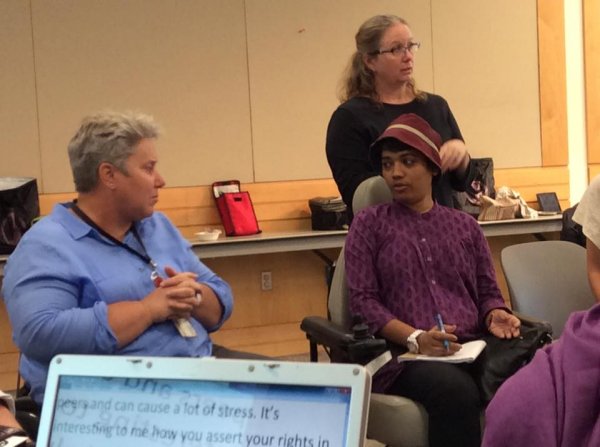
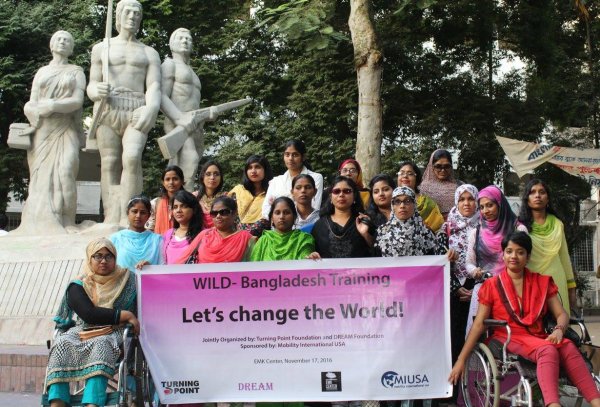
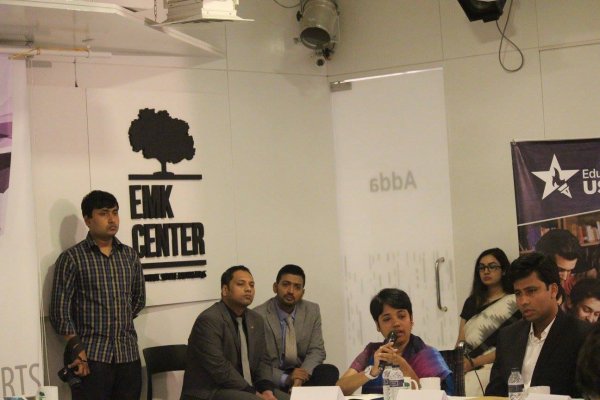
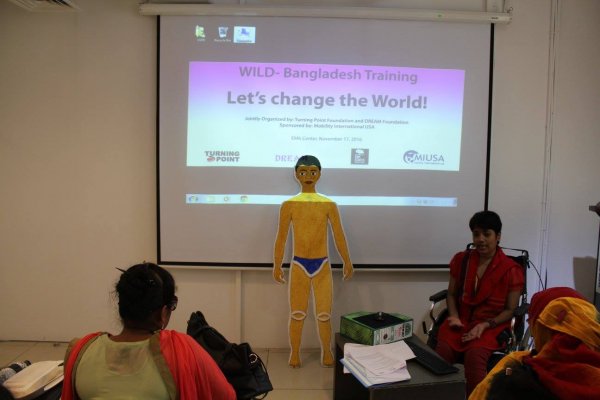
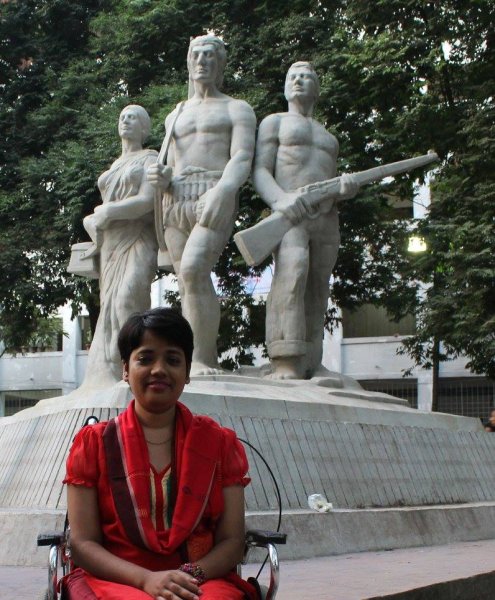
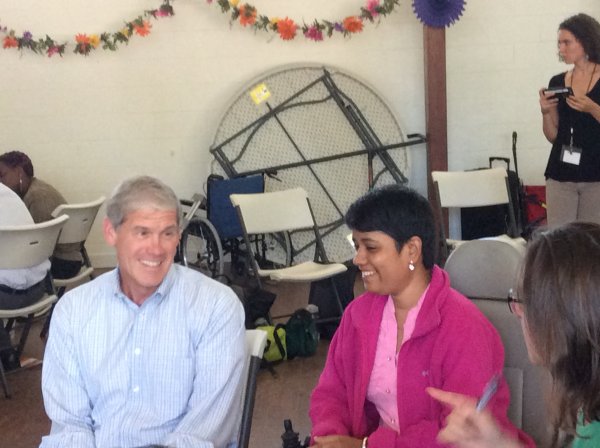

.png)










